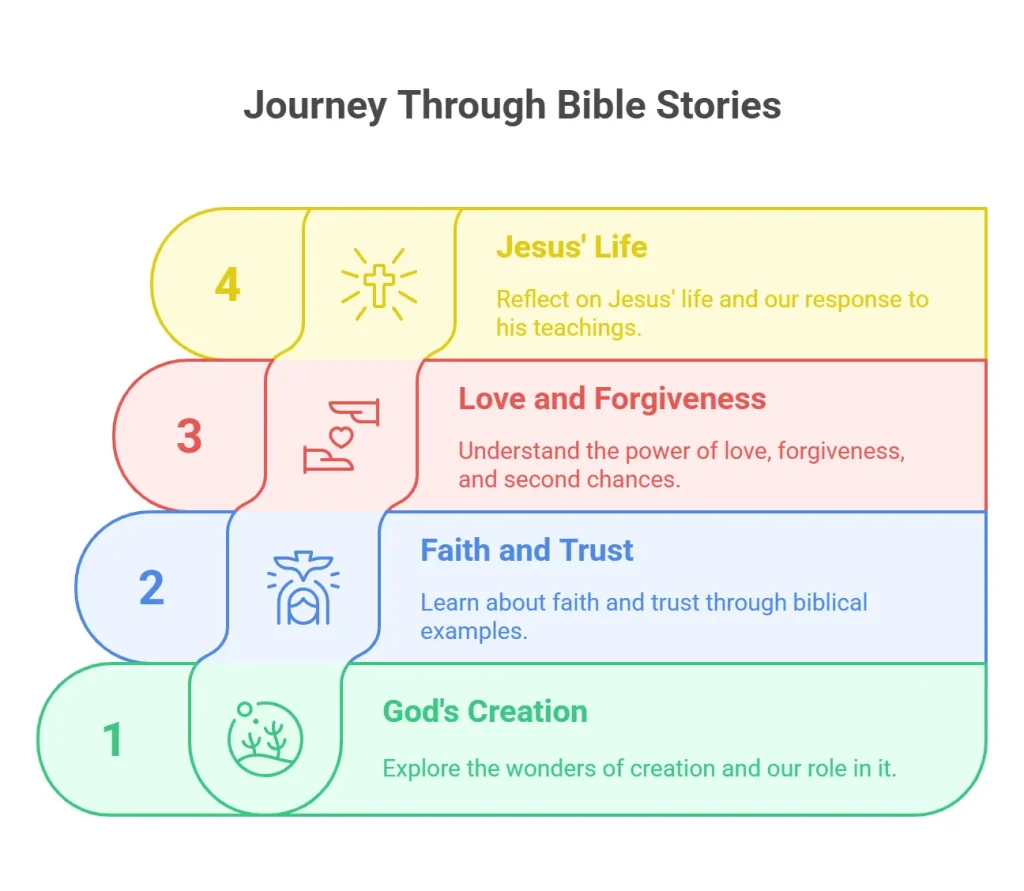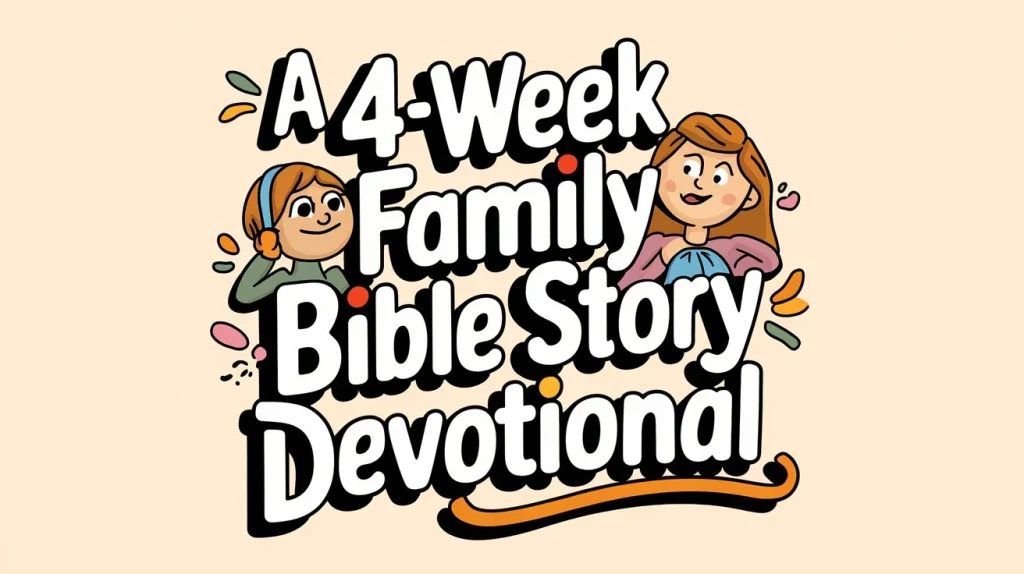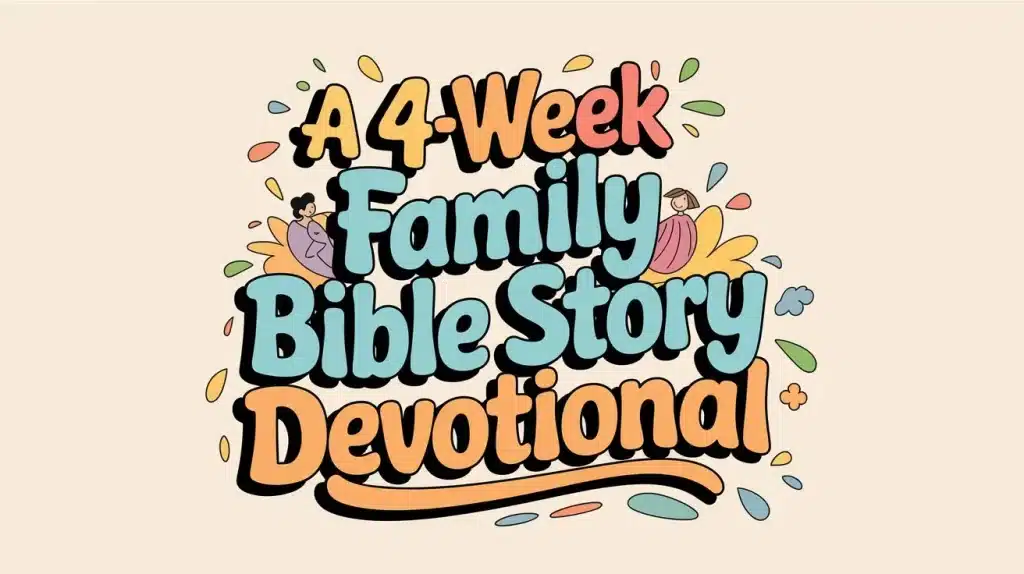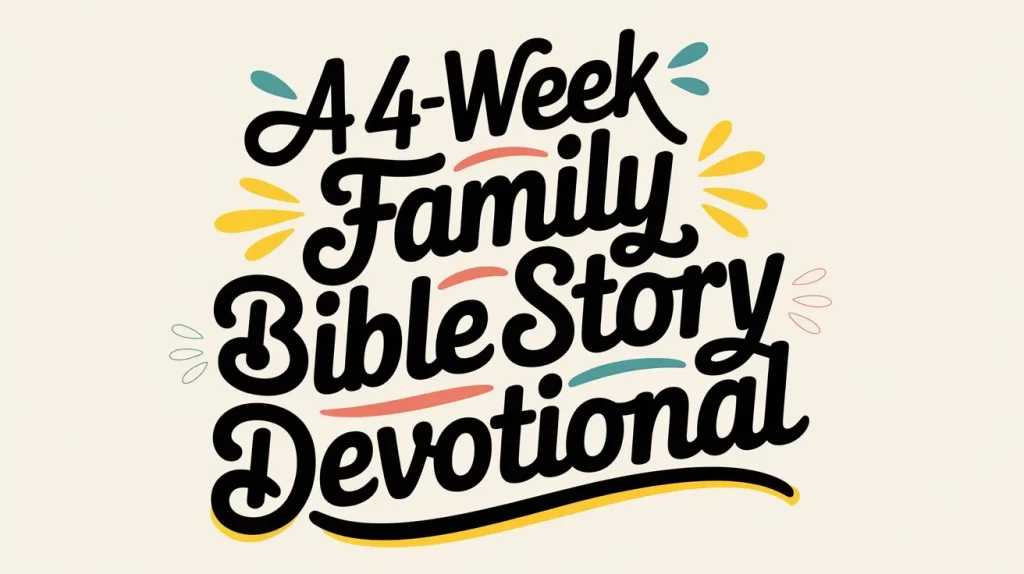A 4-Week Family Bible Story Devotional You Can Start This Month
Starting A 4-Week Family Bible Story Devotional You Can Start This Month has transformed countless families in my Sunday School community. I've watched parents and children grow closer through these structured weekly studies that build upon each other progressively.
Creating consistent family devotional time requires intentional planning and age-appropriate content that engages everyone. These four weeks focus on foundational biblical themes that strengthen family bonds while teaching essential spiritual truths systematically.
- A 4-Week Family Bible Story Devotional You Can Start This Month
- Daily Devotional Structure for Success
- Age Adaptations for Every Family
- Making It Stick: Long-term Impact
- Family Devotional Quiz for Parent
- Which Bible character built an ark according to God's instructions?
- What did Abraham demonstrate when God asked him to leave his homeland?
- How did Joseph respond to his brothers who sold him into slavery?
- What was Jesus' first recorded miracle?
- What does the story of the Good Samaritan teach families?
A 4-Week Family Bible Story Devotional You Can Start This Month
Throughout my fifteen years of teaching Sunday School, I've discovered that family devotionals work best when they follow a clear structure and build progressively. This 4-week Bible study focuses on core themes that resonate with all family members, from preschoolers to teenagers.
Each week targets a specific biblical principle through carefully selected stories that complement each other. I've designed this family devotional guide to require minimal preparation while maximizing spiritual impact through interactive Bible study and practical application. This monthly Bible study plan transforms ordinary evenings into meaningful spiritual growth opportunities.
The beauty of a structured family devotional lies in its ability to create lasting memories while building biblical literacy. When families commit to consistent Bible story time, children develop stronger spiritual foundations and parents discover fresh insights into familiar narratives. This four-week journey covers creation, faith, forgiveness, and Jesus' life, an essential themes every Christian family should explore together.
Week 1: God's Creation and Our Purpose

Day 1: In the Beginning starts with God's creative power and establishes the foundation for understanding our world. "In the beginning God created the heavens and the earth. Now the earth was formless and empty, darkness was over the surface of the deep" (Genesis 1:1-2). The Creation Story Day 1-7 provides detailed insights for each day of creation that children love exploring.
I've found that creation stories capture children's imagination while teaching them about God's power and intentional design. Discuss how God spoke everything into existence, from light and darkness to seas and dry land. Children enjoy acting out each day of creation, making sound effects for animals, and drawing their favorite created things.
Day 2: Made in God's Image explores humanity's special place in God's creation. "So God created mankind in his own image, in the image of God he created them; male and female he created them" (Genesis 1:27). The Story of Adam and Eve for Preschoolers explains this foundational truth in language young children understand.
This lesson helps children understand their unique value and special relationship with God. Unlike animals or plants, humans were created to have fellowship with God and to care for His creation. Discuss how being made in God's image means we can think, choose, love, and create like He does.
Day 3: The First Family teaches about relationships, choices, and consequences. Focus on how God's design for families includes love, care, and obedience to His guidelines. "The Lord God took the man and put him in the Garden of Eden to work it and take care of it" (Genesis 2:15). Discuss how God gave Adam and Eve everything they needed and one simple rule to follow.
Day 4: Consequences and Hope addresses the fall and introduces God's promise of redemption. "But the Lord God called to the man, 'Where are you?'" (Genesis 3:9). This story teaches children that mistakes have consequences but God still loves us and wants to restore our relationship with Him. Even when Adam and Eve disobeyed, God provided clothing and made a promise about future salvation.
Day 5: Noah's Obedience demonstrates faithful response to God's instructions despite ridicule from others. "Noah was a righteous man, blameless among the people of his time, and he walked faithfully with God" (Genesis 6:9). Noah and the Flood Kids Story shows how obedience brings protection and how God keeps His promises.
Children love discussing the practical aspects of Noah's obedience—building a massive boat, gathering animals, and trusting God's timing. The rainbow covenant teaches about God's faithfulness and His promises to never again destroy the earth by flood.
Week 1 Family Activity: Create a family gratitude list of God's creation gifts you observe daily. Take nature walks and photograph or draw things that remind you of God's creative power.
Week 2: Faith and Trust in Action

Day 1: Abraham's Journey begins with stepping out in faith when God's plan isn't fully revealed. "The Lord had said to Abram, 'Go from your country, your people and your father's household to the land I will show you. I will make you into a great nation'" (Genesis 12:1-2). Story of Abram to Abraham details his faith journey from Ur to the Promised Land.
Abraham's story teaches families about trusting God's timing and following His guidance even when the destination isn't clear. At 75 years old, Abraham left everything familiar to follow God's call. This obedience to God without seeing the complete plan demonstrates mature faith that families can discuss and apply to modern situations.
Day 2: The Ultimate Test explores Abraham and Isaac's story with sensitivity appropriate for children. "Take your son, your only son, whom you love—Isaac—and go to the region of Moriah. Sacrifice him there as a burnt offering" (Genesis 22:2). Story of Abraham and Isaac for Kids demonstrates complete trust in God even during impossible circumstances.
This challenging story requires careful presentation, emphasizing God's provision of the ram and how this event pointed forward to God's own sacrifice of His Son. Children learn that God provides what we need and that trusting God means believing He has good plans even when we don't understand His methods.
Day 3: Moses and the Burning Bush shows God calling ordinary people for extraordinary purposes. "When the Lord saw that he had gone over to look, God called to him from within the bush, 'Moses! Moses!' And Moses said, 'Here I am'" (Exodus 3:4). Moses and the Burning Bush Bible Story for Kids explains divine calling and how God equips those He calls.
Moses felt inadequate for God's calling, but God provided everything Moses needed including his brother Aaron's help. This story encourages children that God uses everyone regardless of their weaknesses or fears. Discuss how God's presence gives us courage to do difficult things.
Day 4: Crossing the Red Sea demonstrates God's miraculous power and perfect timing. "Then Moses stretched out his hand over the sea, and all that night the Lord drove the sea back with a strong east wind and turned it into dry land" (Exodus 14:21). Story of the Israelites Crossing the Red Sea shows divine protection when escape seems impossible.
This dramatic story teaches about God's timing and how He often waits until the last moment to show His power. Children love imagining walls of water on both sides and discussing how the Israelites must have felt walking across on dry ground.
Day 5: David's Courage teaches about trusting God over circumstances and appearances. "The Lord who rescued me from the paw of the lion and the paw of the bear will rescue me from the hand of this Philistine" (1 Samuel 17:37). David and Goliath Bible Story for Kids provides the complete narrative with discussion questions.
David's confidence came from previous experiences with God's protection and his daily relationship with God as a shepherd. This story teaches children that God's strength matters more than physical size and that regular faith practice prepares us for bigger challenges.
Week 2 Family Activity: Share times when your family trusted God during difficult situations. Create a "faith timeline" showing how God has been faithful to your family throughout the years.
Week 3: Love, Forgiveness, and Second Chances

Day 1: Joseph's Forgiveness shows love conquering hurt and choosing forgiveness over revenge. "You intended to harm me, but God intended it for good to accomplish what is now being done, the saving of many lives" (Genesis 50:20). The Story of Joseph in the Bible covers his forgiveness journey from betrayed brother to Egyptian leader.
Joseph's story spans years of injustice, false accusations, and forgotten promises, yet he maintained faith in God's plan. When his brothers came seeking food during the famine, Joseph had the power to revenge but chose mercy and provision instead. This teaches children about holding grudges versus choosing forgiveness.
Day 2: The Prodigal Son demonstrates unconditional parental love and welcoming back those who've strayed. "But while he was still a long way off, his father saw him and was filled with compassion for him; he ran to his son, threw his arms around him and kissed him" (Luke 15:20). The Story of the Prodigal Son for Kids explains this powerful parable about God's love.
This parable teaches about making wrong choices, experiencing consequences, and finding restoration through repentance. Children learn that God's love never stops, even when we make mistakes. The father's response shows eager forgiveness rather than reluctant acceptance.
Day 3: Jonah's Second Chance teaches about God's patience and responding to His calling. "But Jonah ran away from the Lord and headed for Tarshish. He went down to Joppa, where he found a ship bound for that port" (Jonah 1:3). Jonah and the Big Fish Bible Story for Kids shows divine mercy and second chances.
Jonah's reluctance to obey God came from prejudice against the Ninevites, but God's compassion extended to all people. The three days inside the fish gave Jonah time to reconsider his attitude and surrender to God's will. Children learn about doing what's right even when they don't want to and how God's love extends to everyone.
Day 4: The Good Samaritan explores loving our neighbors and helping those in need. "But a Samaritan, as he traveled, came where the man was; and when he saw him, he took pity on him" (Luke 10:33). The Story of the Good Samaritan teaches practical compassion that crosses cultural boundaries.
This parable challenges prejudice and defines "neighbor" as anyone needing help. The Samaritan's actions demonstrate sacrificial love—using his own supplies, time, and money to help a stranger. Children learn about recognizing needs around them and choosing to help regardless of differences.
Day 5: Jesus and Zacchaeus shows transformation through acceptance and how God's love changes hearts. "When Jesus reached the spot, he looked up and said to him, 'Zacchaeus, come down immediately. I must stay at your house today'" (Luke 19:5). This story teaches about seeking Jesus and how His acceptance leads to life changes.
Zacchaeus climbed a tree because his curiosity about Jesus overcame his shame about his height and reputation. Jesus' invitation to eat together showed grace and acceptance, leading to Zacchaeus' genuine repentance and generous restitution to those he'd wronged.
Week 3 Family Activity: Practice forgiveness by writing down hurts on paper and tearing them up together. Discuss how forgiving others frees us from carrying anger and bitterness.
Week 4: Jesus' Life and Our Response

Day 1: The Christmas Story begins with God's greatest gift to humanity. "Do not be afraid, Mary; you have found favor with God. You will conceive and give birth to a son, and you are to call him Jesus" (Luke 1:30-31). The Story of Christmas: Mary and Joseph tells of Jesus' miraculous birth and the obedience of both Mary and Joseph.
The Christmas narrative demonstrates God's plan unfolding through ordinary people willing to trust and obey. Mary's response, "I am the Lord's servant. May your word to me be fulfilled" (Luke 1:38), shows surrendering to God's will despite not understanding everything. Joseph's decision to marry Mary despite the unusual circumstances shows faith in God's plan.
Day 2: Jesus' First Miracle demonstrates divine power and compassion for celebration. "What Jesus did here in Cana of Galilee was the first of the signs through which he revealed his glory; and his disciples believed in him" (John 2:11). Jesus Turns Water Into Wine marks the beginning of His public ministry.
This miracle shows Jesus' care for ordinary human concerns and His power over natural elements. Mary's confidence in Jesus led her to tell the servants, "Do whatever he tells you" (John 2:5). Children learn about trusting Jesus completely and following His instructions even when they don't understand the purpose.
Day 3: Jesus Heals and Helps shows compassion in action and faith rewarded. "Jesus said, 'Receive your sight; your faith has healed you.' Immediately he received his sight and followed Jesus, praising God" (Luke 18:42-43). Jesus Heals the Blind Man in John 9 demonstrates miraculous healing and spiritual sight.
Jesus' healing ministry revealed His divine nature while showing God's heart for human suffering. Each healing demonstrated both physical restoration and spiritual truth. The blind man's growing understanding of Jesus' identity parallels how faith develops through personal experience with God's power.
Day 4: The Ultimate Sacrifice covers Jesus' death and resurrection as God's plan for salvation. "Father, forgive them, for they do not know what they are doing" (Luke 23:34). The Crucifixion of Jesus - Good Friday and Jesus Resurrection Story for Children complete the Easter story.
Present these events as God's love demonstrated through Jesus' willingness to die for our sins. The resurrection proves Jesus' power over death and validates His claims about being God's Son. Children learn that Jesus' sacrifice makes it possible for us to have eternal life and forgiveness for our mistakes.
Day 5: Following Jesus discusses practical Christian living and how families can serve others together. "Then he said to them all: 'Whoever wants to be my disciple must deny themselves and take up their cross daily and follow me'" (Luke 9:23). This lesson connects biblical stories to modern application and family service.
Following Jesus involves daily choices to love others, tell the truth, help those in need, and obey God's commands. Families can serve together through church ministries, community projects, and acts of kindness in their neighborhoods.
Week 4 Family Activity: Plan a family service project to help your community or church. Discuss how serving others demonstrates God's love and how working together strengthens family bonds while helping those in need.
Daily Devotional Structure for Success

Opening Prayer (2 minutes): Let family members take turns thanking God for specific blessings and asking for open hearts to learn from His Word. Encourage children to pray in their own words rather than using formal language.
Bible Story (10 minutes): Read or tell the story using interactive methods, visual aids, and age-appropriate language. I've found that asking questions during the story keeps children engaged and helps them remember important details.
Discussion Questions (5 minutes):
- What surprised you most in this story?
- How did God show His love to the people?
- What can our family learn from this story?
- How can we apply this lesson this week?
Application Activity (5 minutes): Include simple hands-on activities like drawing, acting out scenes, or creating crafts related to the day's lesson. Simple Bible Story Crafts for Preschoolers provides creative ideas.
Closing Prayer (3 minutes): Pray together about applying the lesson to daily life. Ask God to help your family remember and practice what they've learned.
Age Adaptations for Every Family
Preschoolers (3-5 years) need simple language, visual props, and shorter attention spans. Short Bible Stories for Preschoolers provides age-appropriate narratives that capture young imaginations without overwhelming them.
Use picture books, simple costumes, and action songs to help preschoolers engage with stories. Let them act out simple parts and ask basic questions about characters' feelings and actions.
Elementary children (6-10 years) enjoy acting out stories, asking deeper questions, and making connections between different Bible stories. Bible Trivia Questions for Kids with Answers tests their growing biblical knowledge.
Encourage elementary children to read portions themselves and lead family discussions occasionally. They can create story maps, draw character relationships, and compare different stories with similar themes.
Teenagers appreciate real-world applications, discussing controversial topics, and exploring how biblical principles apply to modern challenges like peer pressure, social media, and future decisions.
Include teens in planning devotional times and let them research historical contexts or geographical settings for stories. They can lead discussions about applying biblical principles to contemporary situations.
Making It Stick: Long-term Impact
Bible memory verses from each week's stories help families remember key truths throughout the month and beyond. Fun Ways to Teach Kids Bible Verses provides creative memorization methods including songs, games, and visual associations.
Family Bible study journals let each member record thoughts, drawings, prayers, and personal applications throughout the four weeks. Review these journals monthly to see spiritual growth and answered prayers.
Weekly review sessions help families discuss how they've applied biblical principles in daily situations. Share success stories and challenges they've faced while trying to live out biblical truths.
Create family traditions around your monthly devotionals such as special snacks, celebration meals after completing each week, or service projects related to the month's theme. Creating Christian Family Traditions offers additional ideas for meaningful celebrations.
Seasonal connections help families remember stories throughout the year. Creation stories work well in spring, harvest stories fit autumn perfectly, and Christmas and Easter narratives align with holiday celebrations naturally.
This 4-week family devotional provides a foundation for lifelong Bible study habits that will strengthen your family's faith and create lasting memories of learning together about God's love and faithfulness.
Family Devotional Quiz for Parent
Which Bible character built an ark according to God's instructions?
Noah built the ark following God's detailed plans to save his family and animals from the worldwide flood (Genesis 6-9).
What did Abraham demonstrate when God asked him to leave his homeland?
Abraham demonstrated faith and obedience by leaving his country and family to follow God's call to an unknown land (Genesis 12:1-4).
How did Joseph respond to his brothers who sold him into slavery?
Joseph forgave his brothers and told them that God used their evil intentions for good purposes in saving many lives (Genesis 50:20).
What was Jesus' first recorded miracle?
Turning water into wine at the wedding in Cana was Jesus' first miracle that revealed His divine glory (John 2:1-11).
What does the story of the Good Samaritan teach families?
The Good Samaritan teaches us to love and help others regardless of their background or social status (Luke 10:25-37).
Continue building your family's biblical foundation by exploring Ways to Make Family Bible Study Engaging where you'll discover creative methods to keep every family member excited about studying God's Word together.
Leave a Reply

Related Posts